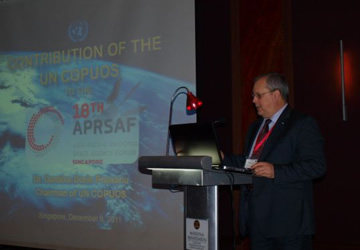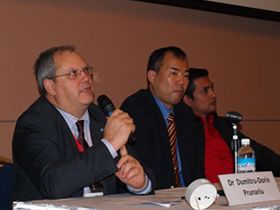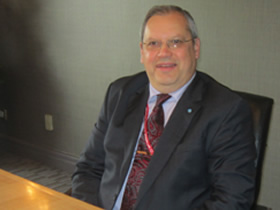Interview with Ambassador Dumitru-Dorin Prunariu, Chairman, UNCOPUOS, December 2011, APRSAF-18 in Singapore <Part2>
The APRSAF Secretariat interviewed Ambassador Dumitru-Dorin Prunariu, the only Romanian cosmonaut and current Chairman of the United Nations Committee on the Peaceful Uses of Outer Space (UNCOPUOS) during APRSAF-18. He talked about how his experience as an astronaut influenced his career, and he shared his views on space activities among Asian-Pacific countries and the role of APRSAF.
Continued from <Part1>
Now then, what do you think of the space activities in the Asian countries as the chairman of the COPUOS?

Dr. Prunariu on his presentation
A: First, I highly appreciate any regional cooperation in outer space. Particularly in the Asia-Pacific region, natural hazards are very common. They should be solved in a specific manner enhancing local, regional, and global cooperation. What I notice, taking part in APRSAF for the third time, is the fact that cooperation is more and more efficient. APRSAF is a very strong and serious organization, proposing specific programs and accomplishing them. And all of these programs, using information from outer space, are really helping a lot of Asian countries to develop, to apply new, more efficient technologies.
Q: The status of space activities among Asian countries is very different from country to country.
A: That's right. It is important for both strong countries and developing countries to be included in common projects because one of the main problems in developing countries is capacity building. Infrastructures are necessary to build capacity, to use space technology. In APRSAF, strong countries have space infrastructure, like Japan and India. At the same time, China is a fast-developing space power. In this region, there are two mechanisms for space cooperation and projects: APRSAF and APSCO. Of course, better cooperation between them is welcome.
Q: So, do you think the framework of APRSAF is very useful for Asian countries?
A: Yes, I looked carefully at the presentations made at the APRSAF. A lot of young specialists, students from developing countries not having until now consistent space activities—like Vietnam or even Bangladesh—made very good presentations, and I appreciate their involvement in important projects promoted within APRSAF. The benefit from such projects and from their training might not be obvious in one or two years, but for sure will be seen one generation from now. To rise and grow and to have real capacities to do things and use outer space for the benefit of your country is a major challenge.
Q: Japanese astronaut Mr. Noguchi said at the side event of the APRSAF-18 that twenty years ago, no one in Japan imagined that there would be a Japanese astronaut. Can you say the same things to other countries?

Dr. Prunariu speaking to his audience at the APRSAF-18
A: In May 2011, I celebrated the thirtieth anniversary of my space flight. Not too many countries could think at that time about a consistent space program and about sending a specialist into outer space. Now it is not so difficult to find individuals who meet all the requirements to be trained and to fly into space. Much more difficult in our days is to find launchers. Our current crisis involves the rockets that send people into space. The space shuttle is retired, China uses its own means only for national programs, and the only carrier of international cosmonauts to outer space is the Russian rocket Soyuz. It carries only three people at a time, and the rate of launches is no more than seven to ten launches every year. When the United States will begin again to have their own governmental or private means to send persons into space, the situation will change. Of course, we also wish to have a European launcher for astronauts, but that time is still very far away. When more launchers are available on the market, the opportunity for small countries as well to have their own astronauts will be, of course, higher.
Q: Could it be that when ESA develops ATV (Automated Transfer Vehicle) with human flight capability, the next Romanian astronaut will appear?

Dr. Prunariu at the interview
A: I really want to have a new astronaut in Romania. Now Romania is a member of ESA and has the full right to take part in the selection for new astronauts. However, so far, Europe doesn't have its own means to launch persons to space. The modification of ATV to carry persons into space is not yet previewed. Even the modified Soyuz, launched from French Guiana as a medium-sized launcher for Europe, is not previewed to have capacities to send people into space. If a Romanian candidate is to be selected during the next selections in Europe, the first task is basic training for about three or four years and then a stay on the line until his (or her) previously selected colleagues fly into space. It could take all together even more than eighteen to twenty years from now. Well, my expectations about having a new Romanian astronaut are not very optimistic.
Q: I hope for that day to arrive. Thank you.